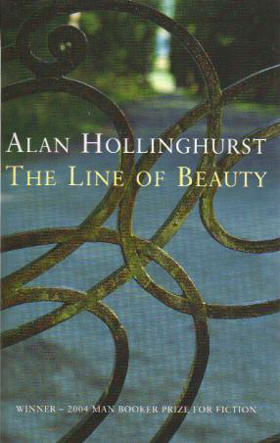
Alan Hollinghurst
The following novels constitute the shortlist for the 2004 Booker Prize:
2004 Longlist
Notable Omissions from the 2004 Long/Shortlist

|
The Line of Beauty Alan Hollinghurst |
Dustjacket synopsis:
"It is the summer of 1983, and young Nick Guest has moved into an attic room in the Notting Hill home of the Feddens:
Gerald, and ambitious new Tory MP, his wealthy wife Rachel, and their children Toby and Catherine. Nick had idolized Toby
at Oxford, but in his London life it will be the troubled Catherine, the critic and rebel of the family, who becomes both
his friend and uneasy responsibility.
"As the boom years of the mid-80s unfold, Nick, an innocent in matters of politics and money, becomes caught up in the Fenndens' world -- its grand parties, its surprising alliances, its parade of monsters both comic and menacing. In an era of endless possibility, Nick finds himself able to pursue his own private obsession with beauty -- a prize as compelling to him as power and riches are to his friends. An affair with a young black council worker gives him his first experience of romance; but it is a later affair, with a beautiful millionaire, that will change his life more drastically and bring into question the larger fantasies of a ruthless decade.
"Framed by the two general elections which returned Mrs Thatcher to power, The Line of Beauty unfurls through four extraordinary years of change and tragedy. Richly textured, emotionally charged, disarmingly funny, it is a major work by one of the finest writers in the English language."
First Paragraph:
Peter Crowther's book on the election was already in the shops. It was called Landslide!, and the witty assisant at Dillon's had arranged the window in a scaled-down version of that natural disaster. The pale-gilt image of the triumphant Prime Minister rushed towards the customer in a gleaming slippage. Nick stopped in the street, and then went in to look at a copy. He had met Peter Crowther once, and heard him described as a hack and also as a 'mordant analyst': his faint smile, as he flicked through the pages, concealed his uncertainty as to which account was nearer the truth. There was clearly something hacklike in the speed of publication, only two months after the event; and in the actual writing, of course. The book's mordancy seemed to be reserved for the efforts of the Opposition. Nick looked carefull at the photographs, but only one of them had Gerald in it: a group picture of 'The 101 New Tory MPs', in which he'd been clever enough, or quick enough, to get into the front row. He sat there smiling and staring as if in his own mind it was already the front bench. The smile, the white collar worn with a dark shirt, the floppy breast-pocket handkerchief would surely be famous when the chaps in the rows behind were mere forgotten grins and frowns. Even so, he was mentioned only twice in the text - as a 'bon viveur', and as one of the 'dwindling minority' of Conservative MPS who had passed, 'as Gerald Fedden, the new Member for Barwick, so obviously has', through public school and Oxbridge. Nick left the shop with a shrug: but out in the street he felt delayed pride at this sighting of a person he knew in a published book.
From the Picador paperback edition, 2004.
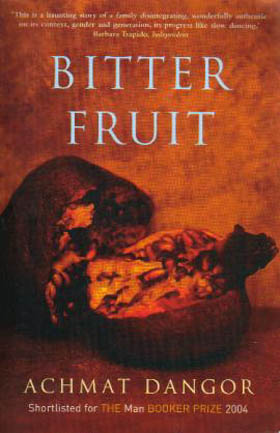
|
Bitter Fruit Achmat Dangor |
Dustjacket synopsis:
"The last time Silas Ali encontered the Lieutenant, Silas was locked in the back of a police van and the Lieutenant was
conducting a vicious assault on Lydia, his wife. When Silas sees him again, by chance, crimes from the past erupt into the
present, splintering Ali's fragile family life.
"Bitter Fruit is the story of Silas, Mikey and Lydia, a brittle family in a dysfunctional society. By turns harrowing, erotic and fearlessly satiriical, it is a portrait of modern South Africa that also addresses questions of universal significance."
Quotes:
"This is a haunting story of a family distintegrating, wonderfully authentic on its context, gender and generation, its
progress like slow dancing." - Barbara Trapido, Independent
"Dangor's vivid prose, narrative fluency and facility for literary experiment make Bitter Fruit a considerable
achievement." - Shomit Dutta, Daily Telegraph
"Dangor's South Africa might be bitter, but it is also rich, funny and sensuous. He uses his insider's knowledge to give
a picture that is satirical and analytical while still rooted in the personal and retaining its power to move." - Stephen
Blanchard, Time Out
"Meticulously written and perfectly paced." - Giles Newington, Irish Times
"The unremitting intensity of Dangor's focus is just as notable as its depth." - Laurence Phelan Independent on
Sunday
First Paragraph:
It was inevitable. One day Silas would run into someone from the past, someone who had been in a position of power and had abused it. Someone who had affected his life, not in the vague, rather grand way in which everybody had been affected, as people said, because power corrupts even the best of men, but directly and brutally. Good men had done all kinds of things they could not help doing, because they had been corrupted by all the power someone or something had given them.
'Bullshit,' Silas thought. It's always something or someone else who's responsible, a 'larger scheme of things' that exonerates people from taking responsibility for the things they do.
From the faber and faber paperback edition, 2004.
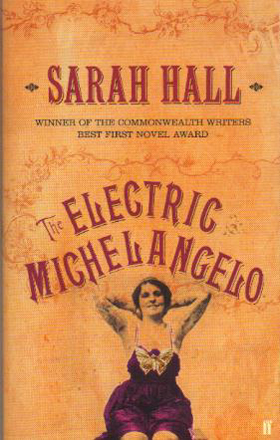
|
The Electric Michelangelo Sarah Hall |
Dustjacket synopsis:
"Opening on the windswept front of Morecambe Bay, on the remote north-west coast of England, The Electric
Michelangelo is a novel of love, loss and the art of tattooing.
"In the uniquely sensuous and lyrical prose that has already become her trademark, Sarah Hall's remarkable new novel tells the story of Cy Parks, from his childhood years spent in a seaside guest house for consumptives with his mother, Reeda, to his apprenticeship as a tattoo-artist with Eliot Riley -- a scraper with a reputation as a Bolshevik and a drinker to boot.
"His skills acquired and a thirst for experience burning within him, Cy departs for America and the riotous world of the Coney Island boardwalk, where he sets up his own business as 'The Electric Michelangelo'. In this carnival environment of roller-coatsers and freak-shows, while the crest of the Edwardian amusement industry wave is breaking, Cy becomes enamoured with Grace, a mysterious East European immigrant and circus performer who commissions him to cover her body entirely with tattooed eyes.
"Hugely atmospheric, exotic and familiar, The Electric Michelangelo is a love story and an exquisitely rendered portrait of seaside resorts on opposite sides of the Atlantic by one of the most uniquely talented novelists of her generation."
First Paragraph:
If eyes could lie, his troubles might all be over. If the eyes were not such well-behaving creatures, that spent their time trying their best to convey the world and all its hope to him, good portions of life might not be so abysmal. This very moment, for instance, as he stood by the hotel window with a bucket in his hands listening to Mrs Baxter coughing her lungs up, was about to deteriorate into something nasty, he just knew it, thanks to the eyes and all their petty, nit-picking honesty. The trick of course was to not look down. The trick was to concentrate and pretend to be observing the view or counting seagulls on the sill outside. If he kept his eyes away from what he was carrying they would not go about their indiscriminating business, he would be spared the indelicacy of truth, and he would not get that nauseous feeling, his hands would not turn cold and clammy and the back of his tongue would not begin to pitch and roll.
From the faber and faber paperback edition, 2004.
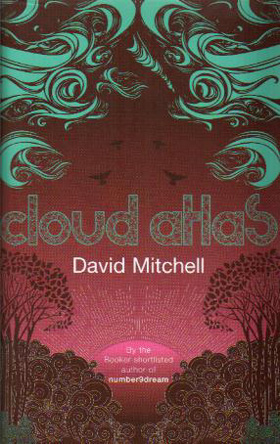
|
Cloud Atlas David Mitchell |
Dustjacket synopsis:
"A reluctant voyager crossing the Pacific Ocean in 1850; a disinherited composer blagging a precarious livelihood in
Belgium between the First and Second World Wars; a high-minded journalist in Governor Reagan's California; a vanity
publisher fleeing his gangland creditors; the testament of a genetically modified 'dinery server' on death-row; and
Zachry, a young Pacific Islander witnessing the nightfall of science and civilisation - the narrators of Cloud Atlas
hear each other's echoes down the corridor of history, and their destinies are changed in ways great and small.
"In a novel of mindbending imagination and scope, David Mitchell erases the boundaries of language, genre and time to offer a captivating meditation on humanity's dangerus will to power, and where it might lead us."
First Paragraph:
Beyond the Indian hamlet, upon a forlorn strand, I happened on a trail of recent footprints. Through rotting kelp, sea cocoanuts & bamboo, the tracks led me to their maker, a white man, his trowzers & Pea-jacket rolled up, sporting a kempt beard & an outsized Beaver, shovelling & sifting the cindery sand with a tea-spoon so intently that he noticed me only after I had hailed him from ten yards away. Thus it was, I made the acquaintance of Dr Henry Goose, surgeon to the London nobility. His nationality was no surrise. If there be any eyrie so desolate, or isle so remote that one may there resort unchallenged by an Englishman, 'tis not down on any map I ever saw.
Had the doctor misplaced anything on that dismal shore? Could I render assistance? Dr Goose shook his head, knotted loose his 'kerchief & displayed its contents with clear pride. 'Teeth, sir, are the enamelled grails of the quest in hand. In days gone by this Arcadian strand was a cannibals' banqueting hall, yes, where the strong engorged themselves on the weak. The teeth, they spat out, as you or I would expel cherry stones. But these base molars, sir, shall be transmuted to gold & how? An artisan of Picadilly who fashions denture-sets for the nobility pays handsomely for human gnashers. Do you know the price a quarter pound will earn, sir?'
I confessed I did not.
From the Sceptre hardback edition, 2004.
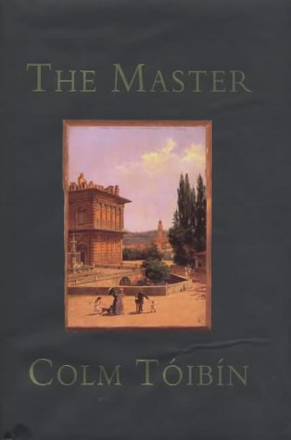
|
The Master Colm Tóibín |
Dustjacket synopsis:
"In January 1895 Henry James anticipates the opening of his first play, Guy Domville, in London. The production
fails, and he returns, chastened and humiliated, to his writing desk. The result is a string of masterpieces, but they
are produced at a high personal cost.
"In The Master Colm Tóibín captures the exquisite anguish of a man who circulated in the grand parlors and palazzos old Europe, who was astonishingly vibrant and alive in his art, and yet whose attempts at intimacy inevitably failed him and those he tried to love. It is a powerful account of the hazzards of putting the life of the mind before the affairs of the heart."
Quotes:
"A marvel of lightly worn research and modulated tone" - John Updike, The New Yorker
"A tour de force of a novel...The Master is a lovely portrait of the artist, rich in fictional truth" - Times
Literary Supplement
"An audacious, profound, and wonderfully intelligent book" - Guardian
"It's a delicate,mysterious process, this act of creation, fraught with psychological tension, but Tóibín captures it
beautifully" - Bulletin
"The Master is a portrait of Henry James that has the depth and finish of great sculpture...Long before its end
[Tóibín] has achieved a triumph on his own terms" - Observer
"The Master is not short of a masterpiece" - Independent on Sunday
"A must-read. Colm Tóibín has not only written a spectacular novel he has found a way to pay tribute to Henry James. We
should all be so gifted and so lucky" - Alice Sebold
"The subtlety and empathy with which Tóibín inhabits James's psyche and captures the fleeting emotional nuances of his
world are beyond praise, and even the echoes of the master's style ring true. Far more than a stunt, this is a riveting,
if inevitably somewhat evasive, portrait of the creative life" - Publisher's Weekly
First Paragraph:
Sometimes in the night he dreamed about the dead -- familiar faces and the others, half-forgotten ones, fleetingly summoned up. Now as he woke, it was, he imagined, an hour or more before the dawn; there would be no sound or movement for several hours. He touched the muscles on his neck which had become stiff; to his fingers they seemed unyielding and solid but not painful. As he moved his head, he could hear the muscles creaking. I am like an old door, he said to himself.
It was imperative, he knew, that he go back to sleep. He could not lie awake during these hours. He wanted to sleep, enter a lovely blackness, a dark, but not too dark, resting place, unhaunted, unpeopled, with no flickering presences.
When he woke again, he was agitated and unsure where he was. He often woke like this, disturbed, only half remembering the dream and desperate for the day to begin. Sometimes when he dozed, he would bask in the hazy, soft light of Bellosguardo in the early spring, the distances all misty, feeling the sheer pleasure of sunlight on his face, sitting in a chair, close to the wall of the old house with the smell of wisteria and early roses and jasmine. He would hope when he woke that the day would be like the dream, that traces of the ease and the colour and the light would linger at the edge of things until night fell again.
From the Picador paperback edition, 2005.
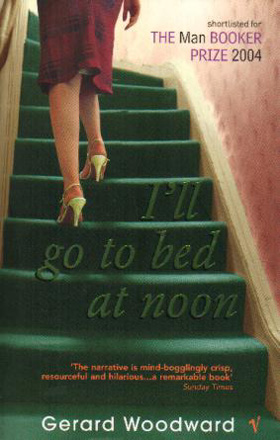
|
I'll Go to Bed at Noon Gerard Woodward |
Dustjacket synopsis:
"It is 1970 in the suburbs of north London and, from the untidy comfort of her crowded house, Colette Jones is watching her
older brother go to pieces, drinking himself into oblivion on home-made wine. Colette knows the solace a drink can
provide, being partial to an evening at the Red Lion herself. But soon she finds she cannot afford to ignore the
destructive effect the alcohol is having on her family, and with gritted teeth Colette is forced to exile the alcoholic
son she loves so much from the house. But this act takes its toll and, just as she can't resist a drink, so she can't
resist allowing Janus back into her life -- with heartbreaking consequences for everyone.
"Gerard Woodward's magnificent second novel continues the story of the Joneses, so memorably introduced in August. By way of an odyssey through the pubs, parks and shopping parades of suburban London, it lurches from farce to tragedy as the members of one unforgettable family build and destroy their lives."
Quotes:
"This narrative is mind-bogglingly crisp, resouceful and hilarious...a remarkable book" - Sunday Times
"This is a novel where the characters seem like friends and family. A fine achievement" - Blake Morrison, Guardian
"A painfully funny, beautifully written account of a wayward family falling like dominoes to the demon drink" - Rowan
Pelling
"Woodward's novels rise far above the ordinary. His characters are wonderfully complex and rich" - Daily Telegraph
First Paragraph:
28 Dolperro Gardens
Wood Green
London
N.22
March 30th 1974
Wednesday
Dear Janus
I am very sorry that I have not been able to see you, or even write to you before this. I have been rather ill -- since Sunday afternoon, in fact. I've had a very bad cold combined with asthma and have hardly been able to breathe. After a visit to the doctor's on Tuesday morning I was given a great variety of pills etc and am now a little better. (Lobo is crawling over me.) (I'll have to stop for a moment as she now wants to go out.) Of course, not being at work, I am imprisoned here in this box impersonating a room (I hope I'm going to get paid from work as I'm skint). Still, I am hoping that I shall be able to come and see you on Friday. If I don't, I hope that you will write to me as soon after you receive this letter as possible. I shall look forward to it!
From the Vintage paperback edition, 2005.
Purple Hibiscus, Chimamanda Hgozi Adichie
Maps for Lost Lovers, Nadeen Aslam
Clear: A Transparent Novel, Nicola Baker
The Island Walkers, John Bemrose
Havoc, In Its Third Year, Ronan Bennett
Jonathan Strange and Mr Norrell, Susanna Clarke
Always the Sun, Neil Cross
Becoming Strangers, Louise Dean
A Blade of Grass, Lewis Desoto
The Honeymoon, Justin Haythe
The Great Fire, Shirley Hazzard
Sixty Lights, Gail Jones
The Unnumbered, Sam North
Cooking with Fernat Branca, James Hamilton Paterson
Snowleg, Nicholas Shakespeare
Cherry, Matt Thorne
This page and its contents are copyright © 2006 by Perry Middlemiss, Melbourne, Victoria, Australia.
Last modified: January 16, 2006.